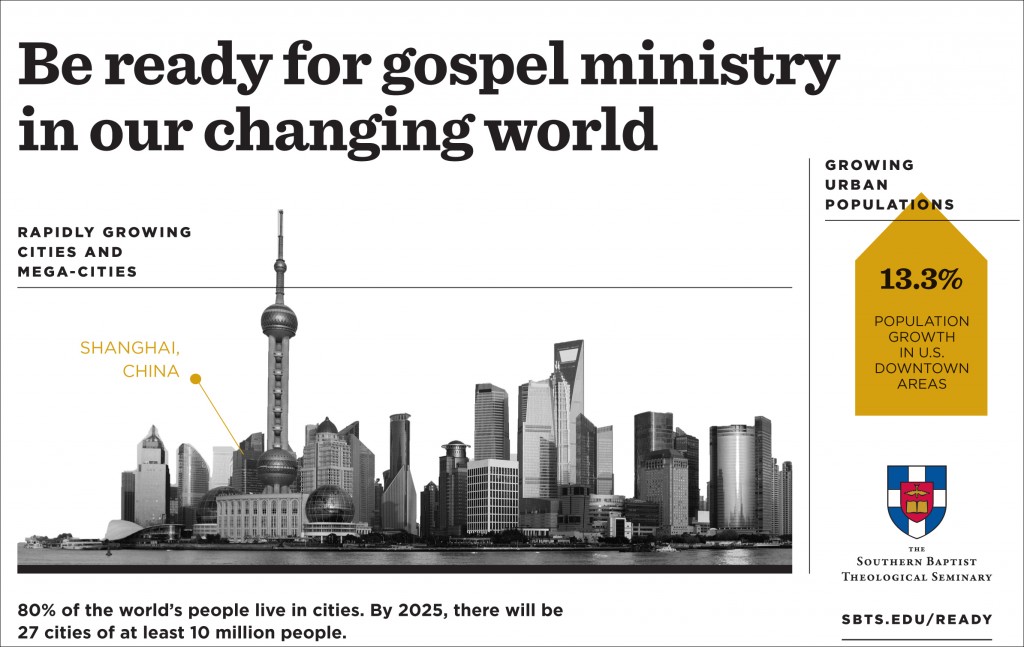The next last frontier: are you ready to minister in the cities?
No alert reader in ministry has to go very far today to find some reference to urbanization, cities or urban missions. It’s a hot topic, and it should be. Cities have always been centers of power, culture, religion and wealth, but the majority of people around the globe lived away from urban hubs. That…
No alert reader in ministry has to go very far today to find some reference to urbanization, cities or urban missions. It’s a hot topic, and it should be. Cities have always been centers of power, culture, religion and wealth, but the majority of people around the globe lived away from urban hubs. That is no longer the case. People are moving into cities in unprecedented numbers; old cities are growing, and new cities (some with populations in the millions) appear every year.
As a Great Commission people, we should have a burning urgency and a healthy fear when we think about global urbanization. Some of the greatest movements of the gospel in history have taken place in cities — think Antioch, Spurgeon’s Metropolitan Tabernacle in London or D.L. Moody’s ministries in Chicago. Overall, however, evangelicals have not thrived in cities, which were usually perceived as dirty, ugly, dangerous and sinful. After all, when we read the Bible, the cities that draw our attention are places like Babel, Babylon, Sodom and Gomorrah. Since Cain built the first city, urban centers have been fallen places filled with fallen people.
That’s where the urgency should rise. As much as I would love a biblical command to “go ye, therefore, unto the cities,” I can’t find it in the Scriptures. There is, however, Christ’s clear charge to make disciples of all nations (Matt 28:18-20) and to proclaim repentance and forgiveness of sins to all peoples (Luke 24:47). Jesus calls his church to preach the gospel to all people. People today are increasingly in cities. So, go.
But go with a healthy fear, because unless you are from the city, urban mission and ministry is cross-cultural. None of us would go among another people group to share Christ without first considering things like language and cultural context. Neither should we approach cities without prayer and preparation.
If God has called you to do ministry in an urban context, whether as a missionary or church planter living in a city or as a pastor or missions leader reaching into a city from outside, here are a few suggestions for how to start:
- It may seem obvious, but start by praying for gospel ministry in your city. There are more examples of this kind of urban ministry in the Bible than anything else. Abraham interceded for Sodom (Gen 18:22-33). Jesus wept for Jerusalem (Luke 19:41). We should pray for cities – for workers, for harvest, for transformation.
- Second, prepare for gospel ministry in your city. Urban mission demands serious preparation. Study and teach the biblical view of the city: not only are urban centers concentrations of sinners and sinfulness, they are also hubs of creativity and influence. Much of Jesus’ ministry and that of the early church took place in cities.
- Once you’ve prayed for insight into the opportunities in your city, open your eyes and look around. Research the history and culture of the city. Find out who lives there and who is coming to live there. One of the distinctive marks of “urbanness” is diversity – cities are filled with both rich and poor, young and old, educated and uneducated. Every global urban center is drawing people from practically all tribes, tongues and nations. Good research will better equip you to find those who need to hear the gospel, where and among whom churches should be planted and how best to connect with people in a busy, crowded, fast-moving culture.
- And study good missiology. The foundational issues of missions (cross-cultural communication, contextualization, etc.) are the same whether you work in a rural African village or an upstart Asian megalopolis. Learn the basics and how to apply them to the urban context.
- Finally, preach the gospel in your city. When doing ministry in the city, it’s easy to get caught up in people’s needs. Poverty, homelessness, sexual exploitation and other urban problems can drain an urban missionary’s energy and focus, as can working with the ultra-wealthy and influential. Urban ministry means caring for those in need, and there will be no shortage of need, but the truth of Romans 10:13-15 is as true in cities as anywhere: to call on Jesus, people must hear, and to hear, someone must speak the gospel. Governments and social agencies do lots of good in cities, but they don’t bring the best news that urban peoples need to hear. You do.
Consider cities. They are the next last frontier of Christian missions.
___________
Jeff Walters is assistant professor of Christian missions and urban ministry at Southern Seminary. Before teaching at the seminary, he was a church planter in Paris, France.
See also:



